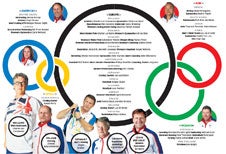Team GB banking on foreign legion
Experts are being headhunted from all over the world to bring Olympic glory but what happens after 2012?

When Fabio Capello took charge of English football almost four years ago surrounded by Italian lieutenants, he succeeded Sven Goran Eriksson as numero uno of a foreign legion that has undertaken the biggest invasion of these shores since the Romans. British sport is commanded by a platoon of coaches imported from overseas, all recruited in the frantic quest for Olympic glory. At least 21 of the 26 sports in which Team GB compete in London will have performance directors or senior coaches who have been expensively head-hunted.
Click HERE to view graphic (214k jpg)
They range from Jürgen Grobler, the East German emigre behind the phenomenal success of British rowing, to Biz Price, the Canadian synchronised swimming Svengali putting a smile on the face of Britain's water babes, and South Korean professor Won Jae Moon, whose expertise has enabled taekwondo hope- fuls to beat his own nation's stars in the land that invented the sport.
Only three Olympic sports, boxing, hockey and shooting, will definitely embark on 2012 with all-British coaching set-ups. Tennis and football have yet to formulate their plans. It is likely both will have Britons in overall charge, though tennis will permit foreign coaches to work with individual players such as Andy Murray.
For the rest, Exchequer and Lottery funding distributed by UK Sport has facilitated the hiring of top-quality coaches from overseas. In all there are 52 foreigners working at various levels. Several are on six-figure salaries. In athletics Charles van Commenee, the Dutch disciplinarian brought in to succeed axed Briton Dave Collins as performance director, is believed to earn approaching £200,000 a year, although it is estimated the total wage bill is only around half the £6 million trousered annually by Capello.
There is no doubt that most British sports have been enhanced by foreign stewardship. So while the Union flag may be flying high over the Olympic Park just over a year from now, perhaps fluttering alongside should be that of the United Nations. No other country has such a cast of foreigners, and 2012's chief Lord Coe is largely responsible for this. After London won the bid six years ago, he said: "It is very simple. If quality coaches aren't available here, you go for the best available elsewhere." His advice has been followed implicitly.
But why are British coaches missing the bus? It is 16 years since Frank Dick quit the athletics arena as Britain's coaching guru after the most illustrious spell the sport has known. He overlorded an inspired era when all that glittered on the track really did turn to gold; from Coe, Cram, Ovett and Thompson through to Christie, Jackson and Gunnell.
Dick, 70, now president of the European Athletic Coaches Association and chair of Scottish Athletics, thinks Britain does not take coaching seriously enough as a profession and that his own sport failed to prepare thoroughly enough for the future.
"There has been an extraordinary negligence in developing our own coaches stretching back 20 years," says Dick, "and it has now become that little bit sexier to bring in someone with a foreign accent. But if you do that you need a strategy to support it. You must make sure that when they move on, you have people to replace them from within our own ranks.
"To be fair to UK Sport they've run a World Class Coaching scheme trying to give an elite coaching experience to home-grown coaches. That will certainly be necessary because I cannot see the majority of sports being able to maintain so many foreign coaches when the caravan moves on after 2012 because of the economic downturn. Unfortunately many sports do not have a Plan B.
"Basically we have said to our coaches, you are not good enough so we are bringing in coaches from abroad. But when the money is not there, are we going to turn to those same coaches we have rejected and expect them to work for less money?"
"Coaches have always had problems with the blazerati who don't like their noses put out of joint," argues Tom McNab, one of Dick's predecessors. "Consequently we have not created that core of tough, hard-bitten professional coaches, which is why we have had to import them."
The decathlon champion Daley Thompson, part of the team that helped secure the 2012 Games, is one of many former gold medallists who have been shunned or put off coaching by bureaucracy. "There's so much red tape and paperwork," he says. "The second biggest resource to talent in athletics is experience. Yet over the last 15 years that experience has simply been wasted. Just look at the world-class athletes Britain has produced over the years, guys like Seb Coe, Steve Cram and Steve Ovett, yet none are involved in coaching. I would be more than happy to help the national cause. I've never been asked."
Join our commenting forum
Join thought-provoking conversations, follow other Independent readers and see their replies
Comments
Bookmark popover
Removed from bookmarks